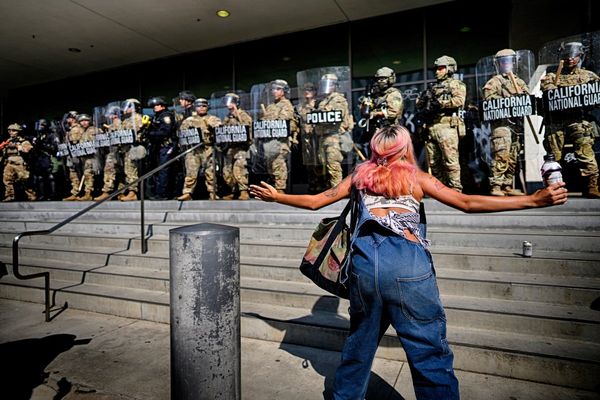DALLAS — Angel Gracia knows a good film studio when he sees one.
Having worked in the industry for decades, the filmmaker, producer and director has experienced a lot of boring, cold or inefficient studios and soundstages.
“It seems like they’re built by people who build warehouses, rather than filmmakers,” he said.
Gracia wants to change that. His company, Concrete Visions, is planning a 72-acre development in Mansfield called Super Studios with five studio “clusters,” each equipped with a soundstage and mill shop that can handle the production of a television season.
The project would bring an estimated 2,000 jobs to the city.
In addition to the studios, Gracia’s plan includes hotels, housing, restaurants and coffee shops aimed to be desirable for people in the industry coming in and out.
“Basically, this is the dream studio a guy like me or anybody in the business would like to see when they get there,” Gracia said. “It’s from the quality of the coffee, all the way to the quality of the grid above you where you have to hang two tons of equipment above people’s heads.”
Developer Richard Kang of New Ark Realty is working on the mixed-use portion of the site where hotels, housing, restaurants and stores will go. The residential component is inspired by production facilities such as Trilith Studios, a Fayetteville, Ga., company whose credits include a host of Marvel superhero movies.
“It’s like a mini city, which is something that is attractive when you’re not in the Hollywood area,” Gracia said. “Filmmakers want to have things nearby they can quickly use.”
Filmmaker turned developer
Gracia started his film career in music videos in the mid-80s, winning an MTV music video contest for Madonna’s "True Blue" single, when MTV was the one and only channel for young people to see and hear their favorite music.
“I was a 20-year-old watching this thing, obsessed with it,” Gracia said.
From music videos, he went into making commercials in the early 2000s for major corporate clients such as Coca-Cola, Toyota and Honda at a company started by Ridley Scott, director of the original "Alien" movie and "Blade Runner." Scott’s brother, Tony, directed "Top Gun" and also worked at the firm.
“I learned with them about directing and production, but also logistics, because the thing about these guys, they’re not just creative people, they’re strategic people,” Gracia said.
Working with the Scotts gave him an appreciation for not only filmmaking, but also for creating the architecture of the places where productions take place. “That was the best, most pleasant creative office in the world,” he said.
Gracia directed a feature film, From Prada to Nada, a Latina take on Jane Austen’s "Sense and Sensibility." It released in 2011.
Gracia, who lived in Hollywood for about a decade, has been based in Portland since the pandemic and plans to temporarily move to Dallas-Fort Worth. He’s currently in pre-production on two films: "Anathema," a horror movie starring Frank Grillo and Sean Patrick Flanery, and "How the Gringo Stole Christmas," a comedy starring George Lopez and Jack Kilmer.
About six years ago, a neighbor asked Gracia about the soundstage business, but Gracia realized he didn’t know much about it. That prompted his curiosity. He learned that because of the demand for content for streaming services, finding a high-end soundstage to film a show is very difficult and may need to be booked a year in advance.
“It’s very limited, because it’s so big and expensive to make these things,” Gracia said. “You cannot build them fast enough because it’s so complicated. So then I realized there was a niche in the market.”
Gracia said he has shopped the idea to four cities in Texas and two in California. He is also moving forward with a 45-acre project in Banning, Calif., east of Los Angeles, with four studio clusters, which city officials there agreed in September to pursue negotiations, the Record Gazette reported.
Unlike the Mansfield project, the California plan doesn’t include surrounding hotels, restaurants and retail — just four studio clusters.
Gracia talked to multiple cities in North Texas, but the project needed land to be a certain size and have certain characteristics, the right zoning and supportive city officials behind it. That’s why he landed on Mansfield.
“They were not only understanding about it, they give us the best place to do it with the best conditions and the best location,” Gracia said.
Mansfield’s close proximity to downtown Dallas and the airports also was a selling point for Gracia. The studios will constantly fly in actors, directors, producers and writers, and people coming to film may want to stay in downtown Dallas hotels or use downtown locations as a backdrop.
“As a film director, you kind of have to take into consideration everything, from your actors, to your script, to strategic stuff that is mechanical and technical and the realities of a location,” Gracia said.
The film opportunity in Texas
While the film industry has not been as prominent in D-FW as in other major metro areas, Gracia said it has major airports, filming locations and weather to be a much bigger player.
“I think it’s a hole in the market,” Gracia said. “The way I see it is you can go to L.A. and you’ll be competing with everybody and their mothers … but you can also say, well, here’s the next place where this belongs, and that takes a little bit of guesswork and foresight.”
Gracia said his company has spoken with Texas officials about boosting the state’s incentives, which are not as competitive as other southern states such as Louisiana, New Mexico or Georgia. Still, at least 29 film and television projects started production in Texas in 2022, according to a list from the Texas Film Commission.
“People are beginning to talk about Texas, people are beginning to talk about Dallas,” Gracia said. “Looking at the map of this country, it is a logical next destination for the business and has potential to grow.”
There are still quite a few hurdles Gracia must overcome to get film productions started in Mansfield.
He has yet to secure construction financing for the studio as it depends on the city’s just-approved support. He said his team has put about $1 million into design and research with some help from private equity.
Conversations with streaming services are yet to take place because the studio has to be up and running first, Gracia said.
He’s confident his team has the experience and connections, both in filmmaking and in real estate, to make this happen. His team includes designer Roberto Montoya and chief financial officer Richard Judson, a real estate broker and financial planner. His company includes subsidiaries Creative Development Team, which will work to recruit productions to the studios, and production arm Creative Tank Ink.
“They all have experience in the business, filmmakers themselves, but they have a strategic thinking behind them,” Gracia said. “So it’s not just the guy who turns on the switch. It’s the guys who understand how to build the switch.”
A big win for Mansfield
The project could be a major economic boon for Mansfield, expanding beyond its strengths in recruiting homebuilders and distribution centers. One season of a show can cost $50 million to $100 million, according to Gracia, and Super Studios would be able to produce two seasons of five shows each year.
TV shows typically take six months to shoot one season and employ an average of 300 people, 80% of which will be local, Gracia said.
Mansfield Economic Development Corp. has owned the vacant property at 563 Easy Drive and 900 S. Sixth St. for a few years and has been marketing it as a business park. Developers have been pushing the site for distribution warehouses, but city officials wanted something different than what was already in Mansfield.
Jason Moore, executive director of the Mansfield Economic Development Corp., said the city council has been pushing for more diversity in jobs and industry types since the city only has a quarter of its developable land left to build on.
Moore said he was connected to Gracia’s company last year through a broker and they’ve been discussing the site since September.
More than 90% of Mansfield residents work outside the city, according to Moore, and officials want to change that through mixed-use developments that bring in office space and sectors such as education, innovation, nonprofits and government.
“We don’t have a lot of opportunities for our own residents here in the city,” Moore said. “Not saying that we can solve that overnight with a couple mixed-use developments, but to create that sustainable approach going forward is definitely what we’re interested in.”
The project could also benefit area students. Gracia said he wants to create a trade school to help students get into high-paying jobs from scratch. It could collaborate with local schools and bring in guests from the industry, he said.
“It is a useful thing for the community and for the studio,” he said. “It is an equal benefit to both because we’re going to need so much crew.”
On average, the lowest-paid crew members on a film set make about $1,800 a week, according to Gracia, and that can climb as high as $5,000 a week. That’s an intriguing possibility for city officials.
“Most of our young students, when they graduate high school, they leave the city and they can’t afford to come back,” Moore said. “So this provides some job opportunities that could keep them here, keep them local in Mansfield. That’s what we’re most excited about.”
———







